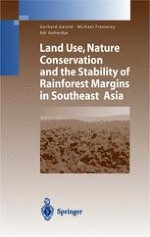2004 | OriginalPaper | Buchkapitel
Creating Political Capital to Promote Devolution in the Forestry Sector — A Case Study of the Forest Communities in Banyumas District, Central Java, Indonesia
verfasst von : Slamet Rosyadi, Regina Birner, Manfred Zeller
Erschienen in: Land Use, Nature Conservation and the Stability of Rainforest Margins in Southeast Asia
Verlag: Springer Berlin Heidelberg
Enthalten in: Professional Book Archive
Aktivieren Sie unsere intelligente Suche, um passende Fachinhalte oder Patente zu finden.
Wählen Sie Textabschnitte aus um mit Künstlicher Intelligenz passenden Patente zu finden. powered by
Markieren Sie Textabschnitte, um KI-gestützt weitere passende Inhalte zu finden. powered by
In recent years, devolution of forest management to local communities has become a major policy trend in developing countries. The term devolution is used here to refer to the transfer of responsibility and authority over natural resources from the state to non-governmental bodies at the local level (Meinzen-Dick and Knox 2001, p. 42). Devolution policies aim to address institutional problems that have been identified as major reasons behind the degradation and misuse of forest resources in developing countries such as state property and centralized management of forest resources, corruption in the forestry administration, lack of effective monitoring, and enforcement and deficient incentives for the local communities (McCarthy 2000a; Ligon and Narain 1999; Wibowo and Byron 1999). Different mechanisms have been identified in the relevant literature on the subject by which devolution can lead to a more sustainable forest management in terms of equity, efficiency, and environmental sustainability: the creation of incentives by a fair and democratic distribution of benefits; the creation of accountability; the reduction of transaction costs; the mobilization of local knowledge; the strengthening of local institutions for sustainable resource management; and — in view of a low state capacity — the limitation of the role of the state to the provision of enabling frame conditions and the protection of public interests (compare Ribot 2002, Meinzen-Dick et al. 2001, Birner and Wittmer 2000; World Bank 1997). However, the empirical evidence on the effects of devolution in the forestry sector has been mixed (Banerjee 1997, Meinzen-Dick et al. 2001, Ribot 2002), which implies a need for more theoretical and empirical research on devolution.
